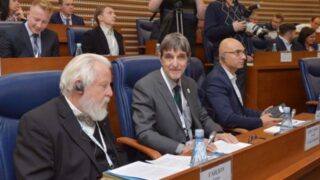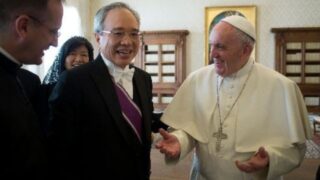Human nature entitles every person to the right to factual truth, granted by free research, and to the right to ultimate truth, granted by religious liberty.
by Marco Respinti*
*Conclusions of the webinar “In Solidarity with Tai Ji Men: Defending Victims of Discrimination and Persecution,” co-organized by CESNUR and Human Rights Without Frontiers on March 24, 2024, International Day for the Right to the Truth Concerning Gross Human Rights Violations and for the Dignity of Victims.


Today the United Nations draws international attention to a very peculiar aspect of the violations of human rights. It is the dignity of the victims. People tend to take that for granted, and to address it implicitly, but the UN aptly wants to bring that aspect to the forefront and focus on it.
Victims of violence and abuse suffer and lose much—often, they even lose their lives. Physical injuries are of course the most visible damage. However, if we concentrate on the gratuitous brutality to which they are exposed, our empathy with victims makes us want to pray, cry, and demand that those harassments and tortures immediately end. We read stories or see pictures and videos, and we shiver with the victims. We feel like being in their shoes. We almost perceive their physical pain in our bodies. The mechanism of the human psyche is made in such a way that we feel that same way also in front of victims who suffered their fate years, decades, even centuries ago.
Human solidarity springs from this identification with victims, which brings to our sensibility and intellect the most horrendous crime that a human being may suffer, dehumanization. It is horrible even to pronounce this word, made of all that we deprecate: the intention, will, and act of stripping human beings of what makes them what they are—human beings.
The horror of dehumanization is the last lie that stands between a victim and a tormentor. On the opposite side lies human dignity. This expression sometimes stirs controversy. Everyone thinks in fact to be authorized to offer a personal conception, sometimes quite whimsical, of what human dignity is—and confusion arises. Let us then adopt the UN minimalistic and at the same time grand proposition: human dignity is a person’s intangible right to truth.
On March 24 every year since 2010, we are prompted to reflect upon the two levels of this sublime concept. The first is the right to know truth, intended as the right to know how facts really went and are, who was truly the victim, who was truly the oppressor, what intention the perpetrator had for dehumanizing a fellow human being. Today’s UN day of observance was established to mark every year the anniversary of the killing of Archbishop Óscar Arnulfo Romero y Galdámez (1917–1980) of El Salvador in 1980.


In fact, sadly, Monsignor Romero—canonized as a saint by the Roman Catholic church in 2018—has not only been deprived of the supreme right to life, as if he were not worth of it, but also of the dignity of the truth on what he stood for. Different ideologues made him the champion of their own twisted understanding of things, or its adversary, thus condemning his memory to be lost in a hell of lies. Establishing March 24 as a day of observance on the right to truth lit a light on Romero, allowing his case to be finally clarified to serve as a standard for other cases.
The second level of the right to truth intends it as the right to ultimate truth. March 24 is a liberating day of observance because it considers a crime of the worst nature that human beings are deprived of their right to believe that truth does or may exist, and to live accordingly as individuals or as a group, within the boundaries of natural law—and also of positive law, when the latter does not contradict the former. Now, this is the intimate material of religious liberty, as I have been graciously granted the possibility to say a few times.
Resisting and fighting the horror of dehumanization based on the right to truth that also the UN brings at the center of its mission means that all human beings must be protected against it, irrespective of what they do or did.
It means we do not recognize the right to truth only to people who “do good things,” people we like and admire and are sympathetic to, our friends, our kin. We recognize it as an intangible right also for people we dislike, we fight, we indict, to criminals and trespassers, to people who do us wrong, and even to persecutors.
We do not do it because we are particularly nice. We do it as we acknowledge that human beings are entitled to the right to truth because of their humanity‒which predates and surpasses all our definitions, preferences, and inclinations. It may be difficult, but if we do not do it, we dehumanize ourselves before dehumanizing others.
Working in the field of religious liberty, one is frequently asked: Are you really defending this person’s beliefs or that group’s doctrines? Sometimes the question also implies, or becomes: Are you really defending the weird theology, or the strange practices of that person or religious group? The short answer is no. That is the field of theologians and philosophers, or the police and the public prosecutors—sometimes of confessors.
Religious liberty is concerned not with beliefs and doctrines, but with human beings and persons. It comes before any deed human beings may do, even in the name of their own right to truth gone astray. A person’s fundamental right to the truth of facts and to ultimate truth does not cease to exist because some people misunderstand or misuse it. This is why laws and judicial procedures of societies that aim at being civilized struggle to grant fair trials, proportionate sentences, and humane treatment even to inmates in prison cells—and differ from rogue states and regimes.


Tai Ji Men’s Shifu, or Grand Master, and dizi, or disciples, enjoy the right to truth that should be granted to every human being. They are entitled to see that right upheld, defended, and promoted. No government and no bureaucrat have the right to curtail the right to truth of Tai Ji Men dizi, or of any other citizen, based on what they think, suppose, or perceive Tai Ji Men dizi, or any other citizen, believe or do. No one can discriminate people, be they Tai Ji Men dizi or any other citizen. People can urbanely discuss with Tai Ji Men about doctrines and ideas, but this is a totally different field. Tai Ji Men’s Shifu and dizi may of course be prosecuted by the law in case they commit crimes, as any other citizen. In this case, defendants should be prosecuted for their acts, not for their beliefs.
Of course, it is not the business of religious liberty to investigate non-religiously motivated crimes. But let us for a moment also consider non-religiously motivated crimes. Justice has investigated Tai Ji Men for many years in the Republic of China (Taiwan). Nothing illegal was found. This was established by courts of law, one after the other. All levels of Taiwanese justice repeatedly concluded that no crime or misdemeanor had been committed by Tai Ji Men, that Tai Ji Men was completely innocent, that Tai Ji Men never committed any of the crimes, some even ridiculous, it was accused of. This is a factual truth—one of the aspects of the right to truth that the UN calls us to honor on March 24. So, also this side of the Tai Ji Men case, that strictly speaking is not the focus of religious liberty, is clarified.
But those who works in the field of religious liberty become immediately interested in these facts when Tai Ji Men is surreptitiously accused of infringements against the law to mask a blatant case of violation against the right to ultimate truth.
So, as Archbishop Romero, Tai Ji Men deserves the right to factual truth on what really happened in the face of false accusations of wrongdoings, as well as the right to ultimate truth for its members who should be granted their spiritual liberty. Only then we will be able to consider the dignity of Tai Ji Men’s Shifu and dizi as fully restored—with respect not to what a passerby, a corrupt bureaucrat, or even a member of Tai Ji Men or a worker in the field of religious liberty subjectively regards as dignity, but as the objective entitlement to humanity that preserves dizi, and all human beings, from the most awful crime—dehumanization.









